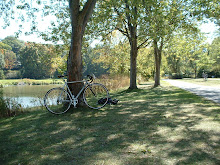I am SO digging The Omnivore's Dilemma by Michael Pollan. I love stuff like how the industrialization of food symbolically began in 1947 when a munitions plant in Alabama had a huge surplus of ammonium nitrate (used for bombs) and was switched over to making chemical fertilizers instead (the ammonium nitrate now being used for nitrogen for plants).
Accoring to Pollan, a fairly well forgotten Nobel Prize winner is the reason why two out of every five people is alive today (or put another way, why 40% of us would be dead without him).
Fritz Haber created the process of making synthetic nitrogen by bonding nitrogen and hydrogen. Synthetic nitrogen then became a fertilizer which massively increased the size of crops and drastically changed the "sheer amount of life earth could support" (pg 42).
Solid enough work to win the man the Nobel prize back in 1920. But Haber's lifestory is actually fascinating. During World War I his work with nitrates allowed Germany to keep building bombs even after their supply of natural nitrate was cut off. He invented some of the poison gases that were used in trench warfare, and he also invented Zyklon B, which Hitler would eventually use in his concentration camps (and the irony being that Haber himself was Jewish).
In 1915, while her husband's poison gases were wafting over trenches and killing the English and French, Haber's wife, who was also a chemist, killed herself over despair at what she and her husband had created. In the 1930's, even though he had converted to Christianity, the increasing Nazism in Germany caused Haber to flee the country and he died in 1934 in Basel. About a decade later, Zyklon B would kill many of his relatives.
Subscribe to:
Post Comments (Atom)

No comments:
Post a Comment